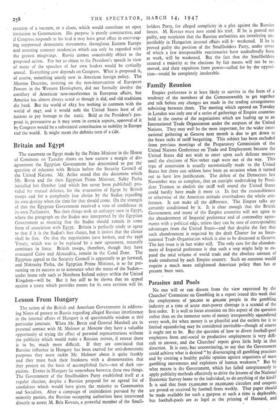Britain and Egypt
The statement on Egypt made by the Prime Minister in the House of Commons on Tuesday shows on how narrow a margin of dis- agreement the Egyptian Government has determined to put the question of relations with Britain before the Security Council of the United Nations. Mr. Attlee stated that the document which Mr. Bevin and the then Egyptian Prime Minister, Sidky Pasha initialled last October (and which has never been published) pro- vided for mutual defence, for the evacuation of Egypt by British troops and for a completely free choice by the Sudan regarding its own destiny when the time for that should come. On the strength of that the Egyptian Government received a vote of confidence in its own Parliament. But then things took an unhappy turn in Egypt, where the paragraph on the Sudan was interpreted by the Egyptian Government as meaning that the Sudan should remain in some form of association with Egypt. Britain is perfectly ready to agree to that if it is the Sudan's free choice, but it insists that the choice shall be free. On that the negotiations have broken, and the 1936 Treaty, which was to be replaced by a new agreement, naturally continues in force. British troops, therefore, though they have evacuated Cairo and Alexandria, remain in the Caital Zone. The Egyptian appeal to the Security Council is apparently to go forward, and Nokrashy Pasha, the Egyptian Prime Minister, is so far pre- suming on its success as to announce what the status of the Sudan— under home rule such as Northern Ireland enjoys within the United Kingdom—will be. But it has still to be shown that an appeal against a treaty which provides means for its own revision will lie.


































 Previous page
Previous page